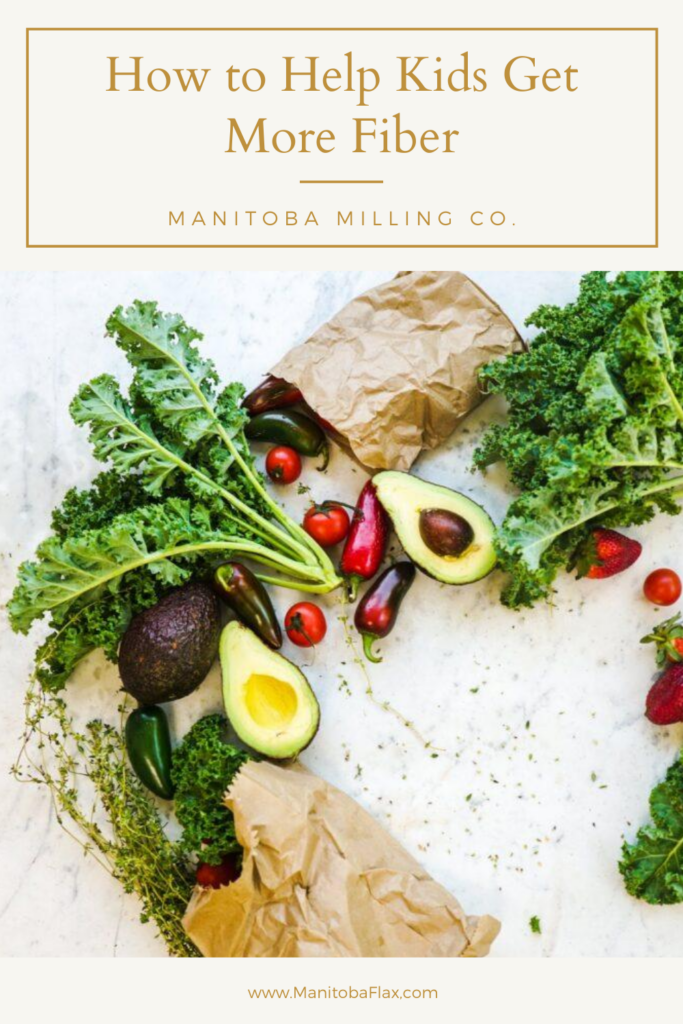Tips for Increasing Fiber Intake with Kids
Nutrition experts consistently talk about the importance of getting enough fiber, but how does this advice translate to children? And how much do they actually need? We’re breaking down this topic and sharing some ideas for increasing fiber intake in your child’s diet including high-fiber, yet still kid-friendly recipe ideas.

Table of Contents
ToggleWhat is Fiber?
Fiber is a type of indigestible carbohydrate, sometimes referred to as the “backbone” of plants. There are two types of fiber:
- soluble fiber, which dissolves in water and turns to a gel as it moves through the digestive tract, slowing digestion.
- insoluble fiber, which does not dissolve in water and adds bulk to stools, speeding up digestion.
Fiber has many health benefits including lowering cholesterol, heart disease and diabetes prevention, and reduced risk of some cancers.
Most people tend to fall short on the intake of fruits, vegetables, whole grains, and pulses (the main sources of fiber). Per the latest USDA Dietary Guidelines, fiber was even determined to be a nutrient of public health concern.
How Much Fiber Does My Child Need?
It’s important for kids to meet recommended fiber needs to help prevent blood sugar spikes, keep digestion regular and aid in satiety to prevent mindless eating.
Most kid-friendly foods are notorious for being low in fiber so it can be challenging to make sure they’re meeting the recommendation for daily intake.
In general, it’s recommended that children get at least five servings of fruits and vegetables daily (in addition to a balanced diet) to meet daily fiber needs. If parents prefer to keep track of grams, The American Academy of Pediatrics recommends adding the number 5 to the children’s age to get an estimate of their child’s daily fiber needs.
For example, a 5-year-old would need at least 10 grams of fiber per day. Many experts recommend more, so please consult with your healthcare professional for your child’s individual needs.
Children may need more fiber if they have digestive issues, such as irritable bowel syndrome or constipation. When increasing fiber intake, be sure to also promote fluids and to increase fiber gradually instead of all at once. Note: consult with your pediatrician before making changes.

How to Increase Fiber Intake
Typical kid’s menu food tends to be lacking in the nutrition department. Favorites such as macaroni and cheese, pepperoni pizza, and chicken strips are often completely lacking in fiber.
Here are some ways you can encourage fiber intake in a fun and approachable way, and serve food that your child still enjoys:
- Serve whole fruit instead of juice at breakfast
- Blend vegetables, like spinach or frozen cauliflower, into smoothies with fruit
- Offer whole-grain breads, crackers, and cereals over sugar cereals
- Add beans to soups and stews and meat dishes
- Serve vegetables alongside accepted foods and allow children to try them multiple times, prepared in a variety of ways
- Add milled flaxseed (4 grams of dietary fiber per serving!) to many of your favorite meals and snacks
Kid-Friendly Flaxseed Recipes
These are some of our favorite kid-friendly flaxseed recipes. Most of them are family-favorites that incorporate flax without a noticeable difference. Get creative with how you choose to include it!
Flaxseed Peanut Butter + Strawberry Flaxseed Spread
Chicken Tenders with Honey Mustard Sauce
Peanut Butter Flaxseed Energy Bites
Sources:
- American Academy of Pediatrics: https://www.healthychildren.org/English/healthy-living/nutrition/Pages/Kids-Need-Fiber-Heres-Why-and-How.aspx
- Nemours & KidsHealth.org: https://kidshealth.org/en/teens/fiber.html
- USDA Dietary Guidelines for Americans (2015-2020): https://health.gov/our-work/food-nutrition/2015-2020-dietary-guidelines/guidelines/chapter-2/a-closer-look-at-current-intakes-and-recommended-shifts/
